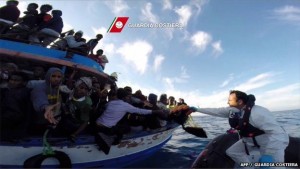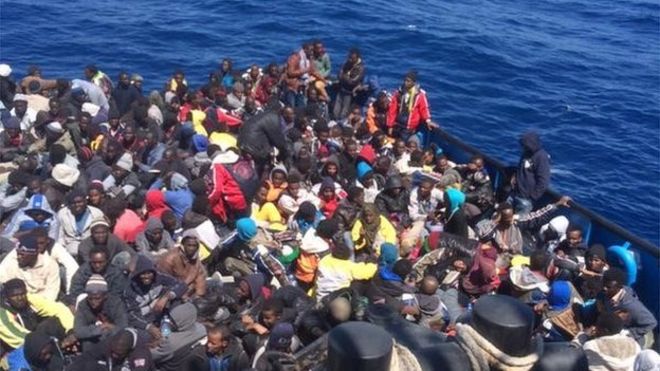Reports indicate that fatal conflict, which saw a group of Muslim passengers allegedly attack a group of Christian passengers, coincided with reports of a new migrant drowning tragedy.
According to wire reports, The San Antonio rescued 128 men adrift from an inflatable raft that was threatening to capsize in rough seas in the Mediterraneanan on October 16 after responding to a call by the Maltese Government.
Four days after a migrant shipwreck off the coast of Libya, in which 400 people are believed to have died, another 41 migrants were missing feared drowned Thursday after their dinghy sank en route to Italy, Italian media reported.
The stricken vessel was spotted by a plane, which alerted the Italian coastguard but by the time a navy ship arrived at the spot only four passengers were found alive, the reports quoted the police and aid agencies as saying.
The four survivors, who came from Nigeria, Ghana and Niger, said they were part of a group of 45 people that set sail from Libya.
A separate group of migrants rescued by an Italian vessel related a deadly standoff over religion in their dinghy, which ended in 12 Nigerian and Ghanaian passengers being drowned, the police said.
The victims were “of Christian faith, compared to their attackers who were of Muslim faith,” police in the Sicilian port of Palermo said in a statement.
Fifteen migrants were arrested on suspicion of “multiple aggravated murder motivated by religious hate”, the statement added.
The incident aboard the vessel, which was carrying about 100 migrants, took place in the Strait of Sicily, between Tunisia and Italy.
According to a group of Nigerian and Ghanaian survivors, a fight broke out over religion, with a group of Muslim passengers threatening the Nigerians and Ghanaians after they declared themselves to be Christians.
“The threats then materialised and 12 people, all Nigerian and Ghanaian, are believed to have drowned in the Mediterranean,” the police statement added.
The remaining passengers were rescued and brought to Palermo, where the 15 alleged attackers, who came from Ivory Coast, Mali and Senegal, were arrested.
The boat, like many of the claptrap vessels flooding Italy’s shores each week with migrants fleeing conflict and poverty in Africa and the Middle East, had set out from Libya on Tuesday, according to the survivors.
The police said the distraught Nigerians and Ghanaians told a “dreadful” story of their struggle to escape with their lives “by forcefully resisting attempts to drown them, forming a veritable human chain in some cases.”
Some passengers had taken photographs of the incident, judicial sources who described the accounts as “coherent” told Italian media.
The International Organization for Migration said it had received reports of “a fight between different groups -– maybe for religious reasons… on one of the boats rescued some days ago.”
Earlier on Thursday Italian Foreign Minister Paolo Gentiloni said Italy had “not had an adequate response from the EU” about the migrant crisis.But European Commission spokeswoman Natasha Bertaud said the organisation had no “silver bullet” for the problem.
Last year a record 170,000 people fleeing poverty and conflict in Africa and the Middle East made the perilous crossing to Italy.
With improving weather conditions, the number of people making the crossing of at least 500km (300 miles) has surged. But vessels provided by people smugglers are often underpowered and overcrowded.
€2.8m (£2m) a month goes on Operation Triton, the border control policy that operates off the Italian coast. Monitoring the Mediterranean may not be enough, says commission spokesperson Natasha Bertaud. “We have neither the money nor the political support to launch a European border guard system,” she told reporters.
Triton has proved an inadequate replacement for the Italian military search-and-rescue operation Mare Nostrum, which cost three times as much. That 2013 mission was activated after a similar tragedy, when 300 migrants drowned.
The Italian government has requested more financial help from the EU, but the question is: how much money are the 28 member states willing to invest?
Only 22 of the members are supporting the current system. Others, including the UK, opted out, describing the policy as unintentionally encouraging more migrant attempts to make the crossing.
Web reports














